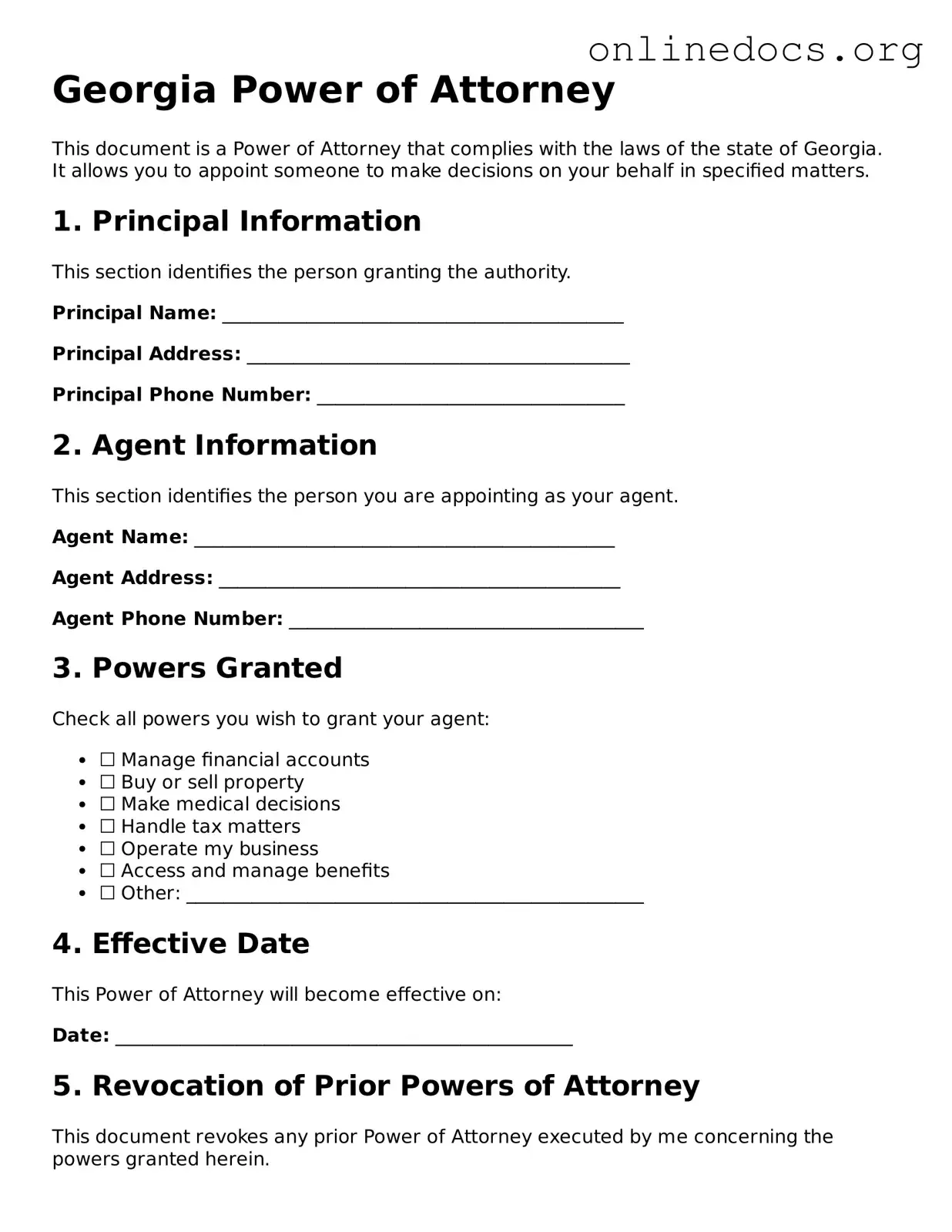The General Power of Attorney is a document that grants broad authority to an agent to act on behalf of the principal. Similar to the Georgia Power of Attorney form, it allows the agent to manage financial and legal matters. The general power of attorney can be used for various transactions, including handling bank accounts, signing contracts, and managing real estate. Both documents require the principal to be of sound mind and may become invalid if the principal becomes incapacitated, unless specified otherwise.
The Durable Power of Attorney differs from the general version in that it remains effective even if the principal becomes incapacitated. This is particularly important for individuals who want to ensure that their financial affairs are managed without interruption. Like the Georgia Power of Attorney, the durable version can cover a wide range of financial decisions and is often used for long-term planning. It provides peace of mind, knowing that an agent can continue to act on behalf of the principal during challenging times.
The Medical Power of Attorney is specifically focused on healthcare decisions. This document allows the agent to make medical choices on behalf of the principal if they are unable to do so. While the Georgia Power of Attorney form can include health-related provisions, the medical version is more specialized. It addresses issues such as treatment options, end-of-life care, and consent for medical procedures, ensuring that the principal's healthcare preferences are honored.
The Limited Power of Attorney grants specific powers to the agent for a defined period or for particular tasks. This document is similar to the Georgia Power of Attorney form in that it allows the principal to delegate authority. However, it is much narrower in scope. The limited power is often used for single transactions, such as selling a car or signing documents for a real estate closing. This ensures that the agent's authority is clearly defined and restricted to specific actions.
To facilitate your vehicle sale process, it's essential to have the right documentation in place. Consider obtaining a comprehensive Motor Vehicle Bill of Sale form for your records by visiting this link: comprehensive Motor Vehicle Bill of Sale form.
The Springing Power of Attorney becomes effective only under certain conditions, typically when the principal becomes incapacitated. This document shares similarities with the Georgia Power of Attorney in that it allows for the management of financial and legal matters. However, the springing aspect means that the principal retains control until a specific event occurs. This can be beneficial for those who want to maintain their autonomy while preparing for potential future incapacity.
The Financial Power of Attorney focuses exclusively on financial matters. This document allows the agent to handle banking, investments, and other monetary transactions. Similar to the Georgia Power of Attorney, it grants the agent significant authority, but it is specifically tailored for financial issues. This ensures that the principal's financial interests are managed effectively, especially in cases where they cannot handle these matters themselves.
The Real Estate Power of Attorney is designed for transactions involving real estate. This document allows the agent to buy, sell, or manage property on behalf of the principal. While the Georgia Power of Attorney form can include real estate transactions, this specialized version focuses solely on property matters. This ensures that the agent has the authority to act specifically in the realm of real estate, which often requires specific knowledge and expertise.
The Child Power of Attorney is used by parents to grant authority to another individual to make decisions on behalf of their minor child. This document is similar to the Georgia Power of Attorney in that it allows for delegation of authority. However, it is specifically geared toward decisions related to the child's welfare, education, and healthcare. This ensures that the child’s needs are met when the parents are unavailable or unable to act.
The Vehicle Power of Attorney allows an agent to handle matters related to a vehicle, such as registration, title transfer, or sale. This document is akin to the Georgia Power of Attorney in that it grants specific authority to act on behalf of the principal. However, it is limited to vehicle-related transactions. This specificity can simplify processes related to vehicle ownership and transfer, ensuring that the agent can act without delay.
